- Home
- Muriel Spark
(1958) Robinson Page 2
(1958) Robinson Read online
Page 2
I often wondered if Agnes and Julia really came to visit Brian, not me; trailing all that way from Chiswick and Wimbledon on cold afternoons. Even during the first phase of my religious conversion, when I took to lecturing my sisters, they continued to come.
Journal, May 20, 1954 — The area of Robinson is only a little over 84 square miles, if you can call them square that run in such strange directions. Robinson bought the island fifteen years ago from a Portuguese and settled here after the war. Its former name was Ferreira. Robinson showed me a map. If you hold it east-upmost it resembles a human shape. There are several peninsulas which Robinson calls the North Arm and the South Arm of the island, the North Leg and the West Leg. Robinson’s house is on a plateau nearly a thousand feet above the sea. It is a volcanic mountain, only cinders and lava at the top, but he says the descent passes through the range of known climates. R. once sprained his ankle up there, when he tripped on a patch of ling. In July the upper third of the mountain is covered with flowering thyme. I have these facts from Robinson. He has given me this notebook. He said, ‘Keep to facts, that will be the healthiest course.’ I am always tired.
Now, as I look at the crinkled page of my first journal entry, I recall that it was Robinson’s idea to write very small, to make no paragraphs, to save the paper. Even so, the exercise book did not last out my time on the island; I had later to use some loose writing paper which I found on Robinson’s desk.
I recall that Robinson had advised more than once, ‘Stick to facts.’ He had advised strongly against gazing at the sea in the hope of a boat or at the sky for a plane —a depressing habit, he said. I could scarcely keep my eyes from the sea and sky in those first weeks, although the boat which would bring Robinson’s provisions and take away his pomegranates was not due at the south coast until the second week of August. I had been pressing Robinson about the possibility of constructing a radio transmitter. He said there were no means. I thought as I wrote my first journal, ‘By now Brian will believe me to be dead.’ But I did not write this down, as I did not know it for a fact.
Chapter II
ROBINSON’S house was an early nineteenth-century building in an earlier Spanish style. It was a stone bungalow set on a wide natural terrace of the mountain. Around it ran a low wall, and over this, from my room, I could see the blue and green lake on mornings when there was no mist. I did not go beyond the great arched wrought-iron gates in the first two weeks. Instead, when my confusion had dissipated, and when I had time off from nursing Tom Wells, I wandered in the small neglected garden or sat in the neglected patio, stroking my injured shoulder and watching the fountain that did not play.
Most of the rooms had been out of use, apparently for some months. I swept them out. Three rooms and the big stone kitchen served as Robinson’s living quarters. Miguel slept in a small room amongst a great amount of fishing equipment. The other rooms were curiously furnished, each one with three floor-beds, mere pallets stuffed with a silky material made out of a local fern, a wicker chair and a polished wood table. Each one had a carved crucifix on the wall. As soon as I had my wits more alert I questioned Robinson about these rooms.
‘Who sleeps there, usually?’
‘The pomegranate men,’ he answered. ‘They are plantation workers who arrive every August by the boat. They remain for three or four weeks working on the pomegranate orchard up at the Headlands and gathering in the fruit, while the boat does business at the Canaries and the west coast of Africa.’
‘And the rest of the year you live alone on the island?’
‘Yes.’
‘With Miguel,’ I added, pumping him for a clue about the boy.
‘Miguel has been with me five years. He is to go to school later this year, and then I will be alone with myself again.’
Certainly I did enquire, ‘Whose child is Miguel?’
‘You do like to get everything straight,’ Robinson said mysteriously.
I was silent then. I was not so concussed that I failed to gather that Robinson was leading me on in some way to express my suspicions. It then flashed upon me that Miguel was not, as in fact I had suspected, Robinson’s own child, probably illegitimate.
‘Quite a mystery, isn’t it?’ said Robinson, quite eager for me to agree.
‘I see no mystery. I can guess his origin,’ I said, meantime wondering what I myself meant, quite.
‘What is it then? What’s your guess?’
‘He’s an orphan of one of the pomegranate men who died, and you’ve adopted him,’ I said for some reason.
Robinson said: ‘You must have heard it from Waterford.’
‘I’ve never been to Waterford.’
‘Jimmie Waterford,’ he said. ‘The tall fair man who was on the plane with you. He must have told you about my adopting Miguel. He knows a little of my affairs.’ He seemed to accuse me as he spoke.
‘No,’ I said, ‘it was a guess. I thought it likely.’
He seemed relieved. ‘You know,’ he said, ‘I expected you to place the paternity on me.’
‘No, that would not be likely,’ I said.
‘Good gracious me,’ said Robinson, looking at me. ‘Women,’ he said, ‘do come out with things.’
Journal, Sunday, 23rd May — This is the end of our second week on Robinson. My shoulder hurts. I suppose it will need electrical treatment when I get home, if ever. I am sitting in the doorway of my room. J[immie] W[aterford] has just returned, and is milking the goat. Robinson is absent. I know now where they have been in the day-time while I have been nursing Tom Wells. First they buried the dead. Next they started examining the wreck, and they are now salvaging from it. Miguel fishes in the stream all morning. Robinson has a list of the dead. There are twenty-six items, and only four names of which he is certain. The others are described by anything which happened to be attached to the corpse, such as a metal watch-band dangling, I suppose, on the charred wrist, a ring on a finger-bone, or a lucky charm worn under the shirt. Robinson has been very efficient. I have seen the list. I am free to walk about on the island now that the dead are buried. Jimmie is singing as he milks the goat, I think a Dutch song. He is partly Dutch, his name was not always Waterford. I remember, now, that I met him on the plane before we crashed. His pronunciation of English is quite good, and his vocabulary most unusual. I think R. is worried about Jimmie, in a personal way, as if he were not a stranger. Jimmie looks slightly like Robinson, about the nose. This is a suspicion. Robinson advised, stick to facts, write facts. All right, there is the fact about Tom Wells, his behaviour to me this morning. I shall have to complain to Robinson.
On that morning I had carried to Tom Wells at noon a bowl of cream of tomato soup which we had opened for him. It was set on a tray with some of our hard thick biscuits. I balanced it in my right hand, my left still being in its sling.
Tom Wells was propped up; for the past week his health had been improving. As I approached his bed, which was a real bed, not, like mine, a mattress on the floor, he said, ‘Have they all been interred?’
‘Yes.’
He put out his hand and touched me.
‘You’re a nice piece of homework,’ he said.
I think I could have saved the soup. Really, I do not know, maybe I deliberately let go of the tray. The soup tipped over him, down the front of his shirt and over the sheets, like blood in a Technicolor film.
Leaving him in this plight I returned to the kitchen, where Robinson was carving a duck-like bird which he had roasted. Jimmie had his back to the door, and when I entered he was speaking rapidly and softly in his Dutch language. Robinson saw me and said to Jimmie in an open voice,
‘Miss January is here.’
The scene with Tom Wells had unnerved me.
‘My name is not Miss January. I am Mrs. Marlow.’
‘Well, well,’ said Robinson.
I said, ‘I have spilt the soup over Tom Wells.’
Robinson went out, returning presently for another bowl of soup. I sat at the kitchen
table and ate the meal staring glumly.
Jimmie Waterford, with his long arms, reached in front of me for the bread. His blond head was out of bandages now.
When Robinson joined us Jimmie addressed me, ‘Ha!’ he said. ‘No man is an island.’
‘Some are,’ I said. ‘Their only ground of meeting is concealed under the sea. If words mean anything, and islands exist, then some people are islands.’
‘That’s a point,’ said Robinson.
‘Is so,’ said Jimmie, ‘mayhaps.’
That afternoon I wrote the journal entry and in the evening I said to Robinson,
‘You must make other arrangements about Wells. I won’t nurse him.’
‘I am not obliged to make any arrangements for anyone,’ he said. ‘Have sense,’ he added, mimicking Jimmie who used often to say, ‘Have sense.’
‘I will not be left alone with that man in this house.’
‘Be reasonable,’ said Robinson.
‘You must speak to him,’ I said. ‘Warn him. Threaten.’
‘I shall say you wear a knife in your stocking.’
Of course I had no stockings. I was lucky to have legs.
‘Listen to the frogs,’ I said, for I had calmed down, and the frogs were howling among the rushes in the mountain lake.
‘How long have you been married?’
‘I’m a widow,’ I said, ‘and a journalist’ — I thought this was understating the case, but it provided an approximate category to poet, critic, and general articulator of ideas. Now that my head was clear I was a little tired of hearing Robinson’s advice, ‘Keep up your journal. Stick to facts. Describe the scenery’, as if, in the normal way, I could not put words together.
Robinson remarked, ‘Those are two conditions of life which make for resourcefulness. You can handle Wells yourself. Try to hide your dislike of him.’
‘Oh, I’ve nothing against him, apart from his conduct this morning.’
‘Why, of course you have,’ said Robinson.
It occurred to me that Robinson resembled, in appearance, my brother-in-law, Ian Brodie, the doctor whom Agnes had married. It was not a strong resemblance—a matter only of the shape of the head, but I wished that it did not exist, seeing that I should have to live with Robinson till August.
Chapter III
‘HELP yourself to any of my books,’ Robinson said.
Now, he had a large library behind glass bookcases. I should not, myself, put books behind glass. Here at home the books are not neat. Robinson’s library was well bound and groomed. I observed that some were uncut first editions. I am addicted to a form of snobbery which will hardly keep a first edition on its shelves. To think of a man keeping uncut first editions on an island gave me a snobbish sort of amusement.
Although my married life had lasted only six months, my husband had conditioned many of my tastes. When I ran away from school to marry him he was fifty-eight, a Classics professor whose mother was connected by marriage to my grandmother. Until he met me he had led a retired life. It was a shock to me to discover he had married me for a bet. Sometimes, when I wondered how it would have been had he lived, and I came to realise how old he would have been — seventy-four at the time of my stay on the island, I shuddered, thinking absurdly of the wrinkled hands of old men. In spite of that, and although my tastes did no longer exactly incline to the scholarly type of man, such as I had married, my taste in books was largely a perpetuation of his. Inside the cover of all Robinson’s books was a bookplate marked with the words:
Ex Libris
Miles Mary Robinson
below which was a fairly dreadful woodcut representing a book open on a table lectern, a quill pen and an old-fashioned lamp on the table. Beneath this, in gothic lettering, was the motto Nunquam minus solus quam cum solus.
Jimmie Waterford came to find me, very shortly after the incident with Tom Wells and the soup. I was teaching the cat to play ping-pong in a corner of the patio, while brown Miguel looked on, silent and very contemptuous of this occupation.
‘One thing,’ said Jimmie, ‘I tell.’
‘Hallo, Jimmie,’ I said.
Jimmie squatted down and I put the ping-pong ball in my pocket for the next lesson.
‘Please to go make tea for Mr. Tom Wells,’ he said to Miguel.
I realised he wanted to talk to me privately, and so I settled myself beside him.
‘Is this,’ he said. ‘To tell you Robinson isn’t man for the ladies. I am not a stranger to Robinson.’
I knew already that he was familiar with Robinson. And there was the likeness about the nose which now caused me to think they might be related.
I had taken rather a liking to Jimmie on the Lisbon plane. This was partly because of his peculiar idiom of English speech which I later learned had been acquired, first from a Swiss uncle, using Shakespeare and some seventeenth-century poets as text-books, and Fowler’s Modern English Usage as a guide, and secondly from contact with Allied forces during the war. And, on the plane, I had taken to Jimmie also because of his seeming unpremeditation in talking to me in the first place.
‘Is bad weather to fly.’
‘Now, is it?’ I said.
‘You like a drink? Lo!’
He screwed the cap off his leather and silver flask, and removed the flat cup from its base.
‘I don’t think so, thanks,’ I said by way of form.
‘You take the cup, I swig from the vessel,’ he said, handing me the cup half-filled with brandy.
Just then a member of the crew with his head bent and brown chin sunk into his neck walked rapidly aft. Within a few seconds he walked quickly back again and disappeared from sight. That was the first and last I saw of the crew of our plane. In the meantime Jimmie was telling me,
‘I think I want my head examined. Mayhaps you think I come on a holiday. Oh no, oh no. Do you make holiday?’
‘No, business,’ I said. ‘Lovely brandy,’ I said, ‘it makes me feel more normal.’
There were clouds molten in the setting sun beneath us and we were going into cloud, climb as we might.
‘I think you are not a business woman,’ said Jimmie, taking a pull from his flask.
‘Thanks,’ I said.
‘Is a compliment,’ Jimmie pointed out.
‘I see,’ I said amiably. ‘Thanks.’
‘I furnish you with a little more hooch.’
‘No, thanks. I’ve had enough. It was nice.’
None the less, he poured some more brandy into my cup which I sipped appreciatively. I find that, when travelling abroad alone, it is wise and actually discreet to take up with one well-chosen man on the journey. Otherwise, one is likely to be approached by numerous chance pesterers all along the line. One must, of course, discriminate, but it is a thing one learns by experience, how to know the sort of man who is not likely to press for future commitments. I felt I was lucky to meet with Jimmie. In fact, I had more or less picked on him at the airport, out of a need for protection from a broad-faced English commercial man with a loud voice and a lot of luggage who had been looking much my way. There were also a couple of Spaniards, who when I failed to recognise their separate salutations, had teamed up with each other.
While I sipped Jimmie’s brandy, I heard the broad-faced Englishman’s voice from several yards to the fore, engaged in conversation with an American couple.
‘Just let me open the brief-case,’ he was saying. ‘I’ll show you the article. I tell you, the pattern dates back to the time of the Druids.’ He fished into his case and produced a circular badge of white metal about three inches in diameter. I could not make out the interior design but it looked like a gnome sitting on a bar within the circle.
‘It’s infallible, I can tell you,’ said the Englishman. ‘It brings the owner the most incredible luck. You see, the shape and pattern is a replica to an nth, an nth of an inch, of an ancient Druid charm discovered on the moors of Devonshire, England, only fifty-seven years ago. It is a magic charm. How i
t works, or why, I don’t pretend to know. But it works.’
‘Well, now,’ said the American lady.
‘Well, now,’ said her husband.
‘We unloaded five hundred thousand the last half of last year to New Zealand alone,’ said the Englishman.
‘Well, now.’
‘If you ask me,’ Jimmie said softly to me, ‘for my part I imagine perchance he wants his head examined.’
I sipped the brandy and nodded agreeably. ‘Hey, there,’ said the Englishman so that his voice carried all up the saloon, and the Americans looked abashed. ‘I’ve been ringing for you, my dear boy,’ he said, as the sun-tanned steward appeared. ‘I fancy a whisky — and what about my friends here?’
‘Lemon squash,’ said the American lady.
‘Tonic,’ said her husband.
‘You need something stronger than that. You stopping at Santa Maria? It’s damp there, I can tell you.’
‘Well, now,’ said the American lady. ‘A squash.’
‘Whisky and tonic,’ said her husband.
‘Going home to the States?’
‘Well, now, Bermuda first,’ said the American lady, her eyes glued to the magic charm which the Englishman was holding between finger and thumb.
Jimmie remarked to me, ‘That man is holding converse in a loud key.’
‘Terrible type,’ I said.
‘I did see this chappie at the airport,’ said Jimmie, ‘and in the moment I behold him I perceive he is not a superior type of bugger. I say to myself, Lo! this one is not a gentleman.’
‘Really?’ I said.
‘I have the instinct for the gentlemen,’ said Jimmie, ‘as likewise for the ladies.’
I thought, ‘He is a most amusing companion’, and meanwhile the plane began to bump through the weather to the Azores. Jimmie’s face was long and fine; his nose turned up slightly at the bridge giving him a humorous expression; his hair was very light; I judged his age to be in the early thirties.
‘You cross the Atlantic Ocean?’ he said.

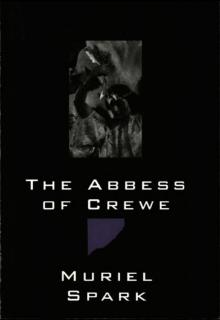 The Abbess of Crewe: A Modern Morality Tale
The Abbess of Crewe: A Modern Morality Tale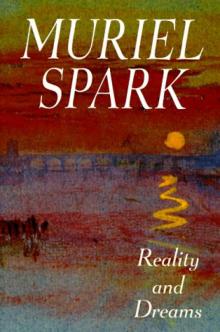 Reality and Dreams
Reality and Dreams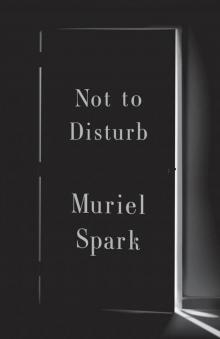 Not to Disturb
Not to Disturb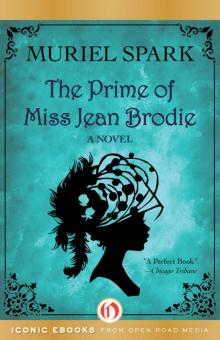 The Prime of Miss Jean Brodie
The Prime of Miss Jean Brodie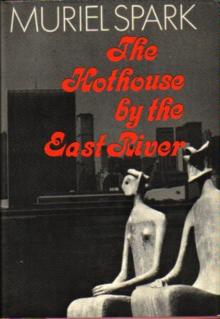 The Hothouse by the East River
The Hothouse by the East River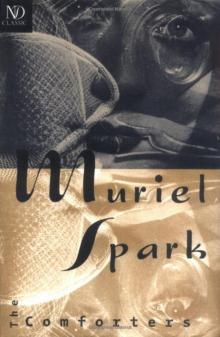 The Comforters
The Comforters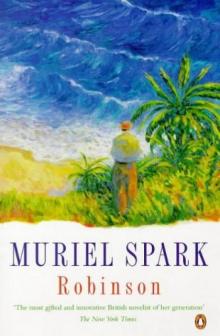 (1958) Robinson
(1958) Robinson Unknown
Unknown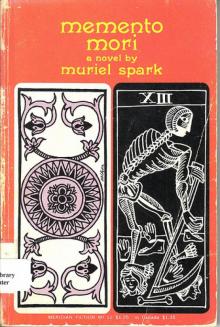 Memento Mori
Memento Mori The Finishing School
The Finishing School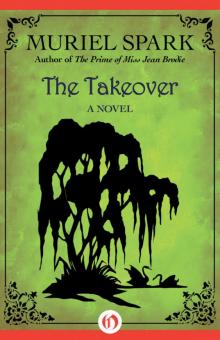 The Takeover
The Takeover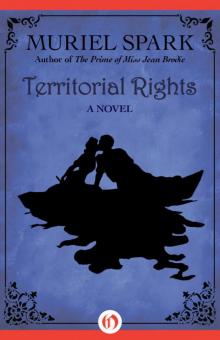 Territorial Rights
Territorial Rights The Complete Short Stories
The Complete Short Stories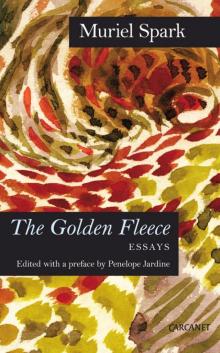 The Golden Fleece: Essays
The Golden Fleece: Essays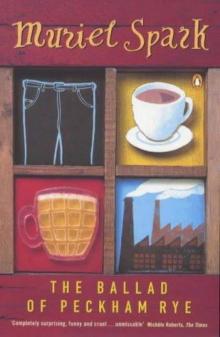 The Ballad of Peckham Rye
The Ballad of Peckham Rye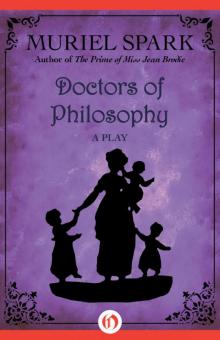 Doctors of Philosophy: A Play
Doctors of Philosophy: A Play The Mandelbaum Gate
The Mandelbaum Gate Loitering With Intent
Loitering With Intent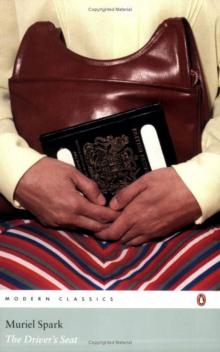 The Driver's Seat
The Driver's Seat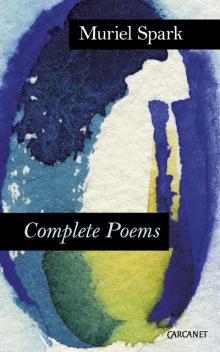 Complete Poems: Muriel Spark
Complete Poems: Muriel Spark Symposium
Symposium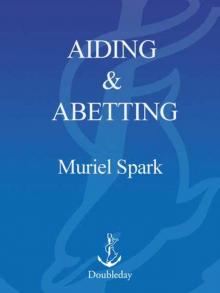 Aiding and Abetting
Aiding and Abetting The Golden Fleece
The Golden Fleece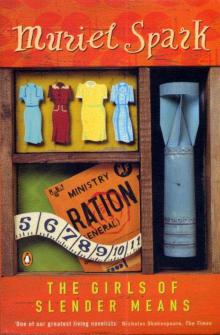 The Girls of Slender Means
The Girls of Slender Means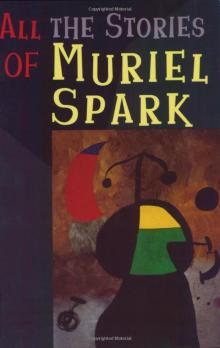 Alice Long’s Dachshunds
Alice Long’s Dachshunds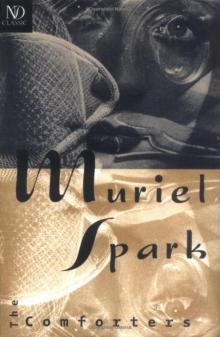 (1954) The Comforters
(1954) The Comforters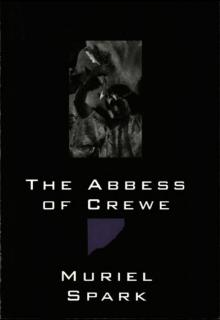 The Abbess of Crewe
The Abbess of Crewe Curriculum Vitae
Curriculum Vitae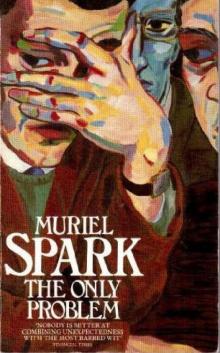 The Only Problem
The Only Problem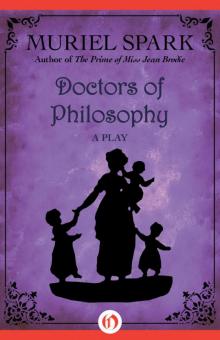 Doctors of Philosophy
Doctors of Philosophy